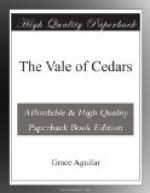Precisely at noon, the folding-doors at the upper end of the hall were thrown widely but noiselessly back, and King Ferdinand, attended by a few pages and gentlemen, slowly entered, and taking his seat, gazed a full minute, inquiringly and penetratingly around him, and then resting his head on his hand, remained plunged in earnest meditation some moments before he spoke.
It was a strange sight—the noiseless, yet universal rising of the assemblage in honor to their Sovereign, changing their position as by one simultaneous movement. Many an eye turned towards him to read on his countenance the prisoner’s doom; but its calm, almost stern expression, baffled the most penetrating gaze. Some minutes passed ere Ferdinand, rousing himself from his abstraction, waved his hand, and every seat was instantaneously resumed, and so profound was the silence, that every syllable the Monarch spoke, though his voice was not raised one note above his usual pitch, was heard by every member of those immense crowds, as individually addressing each.
“My Lords and holy Fathers, and ye Associated Brethren,” he said, “the cause of your present assemblage needs no repetition. Had the murdered and the supposed murderer been other than they are, we should have left the course of justice in the hands of those appointed to administer it, and interfered not ourselves save to confirm or annul the sentence they should pronounce. As the case stands, we are deputed by our illustrious Consort and sister Sovereign, Isabella of Castile, to represent her as Suzerain of the deceased (whom the saints assoilize), and so ourselves guide the proceedings of justice on his murderer. Our prerogative as Suzerain and Liege would permit us to condemn to death at once; but in this instance, my Lords and holy Fathers, we confess ourselves unwilling and incapable of pronouncing judgment solely on our own responsibility. The accused is a friendless foreigner, to whom we have been enabled to show some kindness, and therefore one towards whom we cannot feel indifference: he has, moreover, done us such good service both in Spain and Sicily, that even the grave charge brought against him now, cannot blot out the memories of the past. We find it difficult to believe that a young, high-spirited, honorable warrior, in whose heart every chivalric feeling appeared to beat, could become, under any temptation, under any impulse, that base and loathsome coward—a midnight murderer! On your counsels, then, we implicitly depend: examine, impartially and deliberately, the proofs for and against, which will be laid before you. But let one truth be ever present, lest justice herself be but a cover for prejudice and hate. Let not Europe have cause to say, that he who, flying from the enemies and tyrants of his own land, took refuge on the hearths of our people, secure there of kindness and protection, has found them not. Were it a countryman we were about to judge, this charge were




